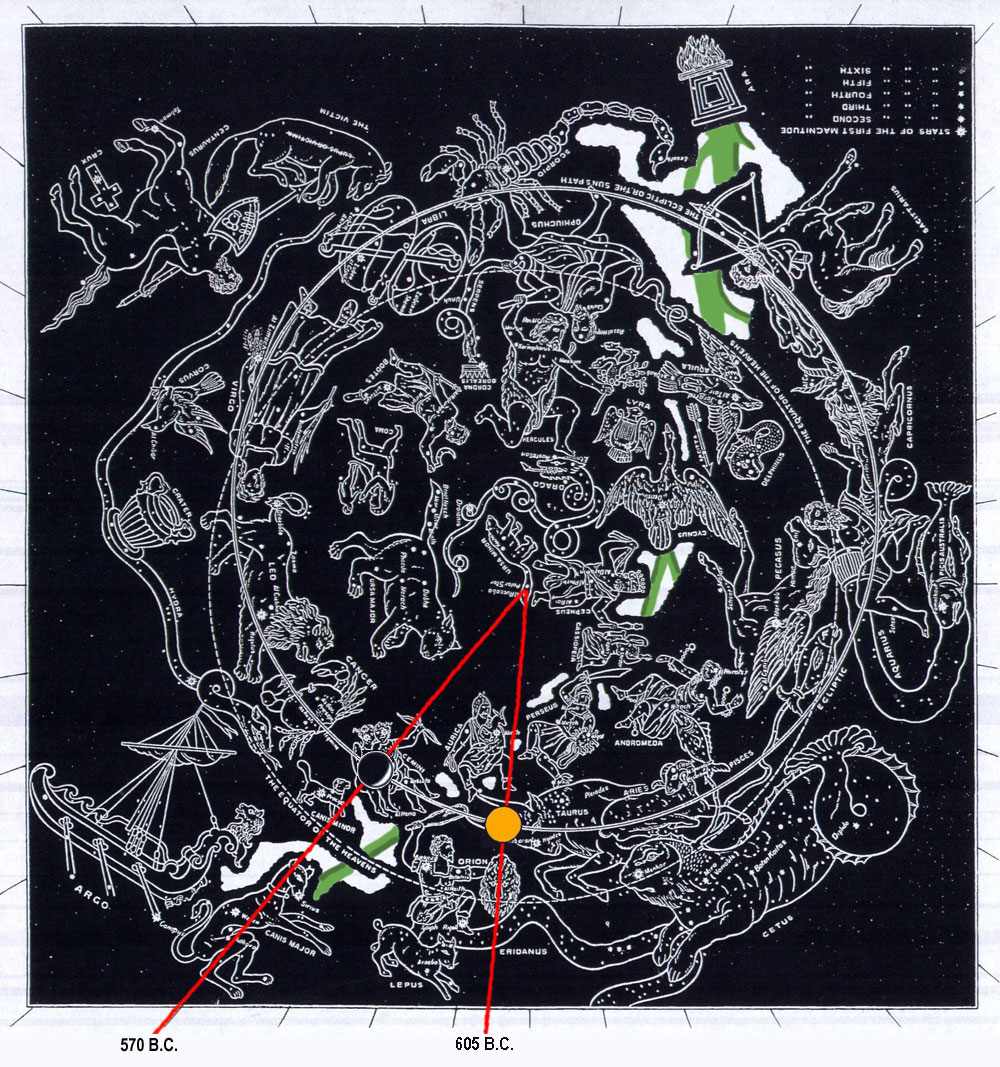

Jeremiah Chapter 47 Star Chart: Once again from "the fourth year of Jehoiakim" (46:2)(604 B.C.) which was "before Pharaoh smote Gaza" (47:1) till (solar) "baldness is come upon (Taurus) Gaza" (47:5) when Pharaoh attacks and "the rushing of his (Auriga) chariots" and "the rumbling of his (Auriga solar) wheels" causes "the (Gemini-Philistine) men" to (lunar open mouth) "cry, and all the (Gemini-Philistine) inhabitants of the land shall (lunar open mouth) howl" (47:2). Then the (red radius) "sword of the Lord" is told to "put up thyself into thy (Gemini) scabbard" (47:6) after 34° years in 570 B.C. We believe the pharaoh's name was Ahmose II who reigned 570 – 526 BC -- the successor of Apries. But there is no historical confirmation.
|
|---|
47:1 The word of the Lord that came to Jeremiah the prophet against the Philistines, before that Pharaoh smote Gaza. failing to see that the disaster there spoken of was to come on Gaza from the north, not from Egypt, identified it with Pharaoh-neco’s capture of “Kadytis,” probably Gaza (Herod. II. 159), after the battle of Megiddo (b.c. 608). The calamities predicted in this chapter befell them probably during the long siege of Tyre, when their country was desolated to prevent their giving Tyre or Sidon any assistance, Jeremiah 47:1-5. the conquest was effected by the defeated army as it was returning from the Euphrates, when Necho, on his march home, reduced Gaza (Hitzig), and by taking this fortress from the enemy, barred the way to Egypt. Of these two alternatives, we can accept neither as probable. The neglect, on the part of the author of the title, to observe the statement that the enemy is to come from the north, would show too great carelessness for us to trust him. But if he did notice the remark, then it merely follows that Pharaoh must have reduced Gaza on his return, after being defeated at Carchemish. 2 Thus saith the Lord; Behold, waters rise up out of the north, and shall be an overflowing flood, and shall overflow the land, and all that is therein; the city, and them that dwell therein: then the (Gemini) men shall (lunar open mouth) cry, and all the (Gemini) inhabitants of the land shall (lunar open mouth) howl. 3 At the noise of the stamping of the (lunar) hoofs of his strong horses, at the rushing of his (Auriga) chariots, and at the rumbling of his (Auriga solar) wheels, the (Gemini) fathers shall not (lunar eye) look back to their (Gemini) children for feebleness of hands; 4 Because of the day that cometh to spoil all the (Gemini) Philistines, and to cut off from (Gemini) Tyrus and Zidon every helper that remaineth: for the Lord will spoil the (Gemini) Philistines, the remnant of the country of Caphtor. 5 (Solar) Baldness is come upon (Taurus) Gaza; Ashkelon is cut off with the remnant of their valley: how long wilt thou cut thyself? 6 O thou sword of the Lord, how long will it be ere thou be (lunar open mouth) quiet? put up thyself into thy (Gemini) scabbard, rest, and be still. 7 How can it be (lunar open mouth) quiet, seeing the Lord hath given it a charge against Ashkelon, and against the sea shore? there hath he appointed it.
|